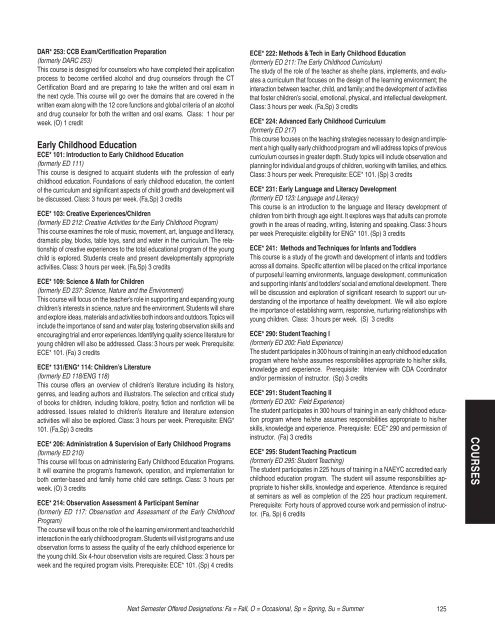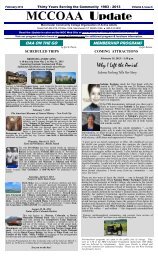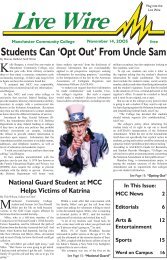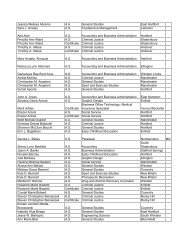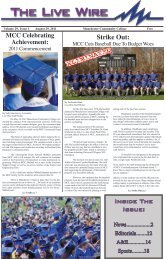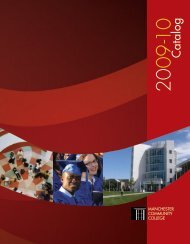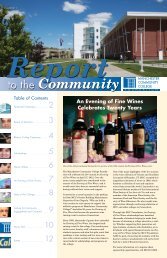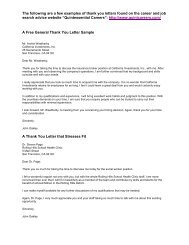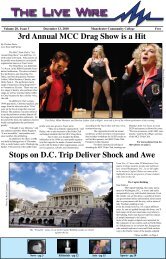Liberal Arts and Science - Manchester Community College ...
Liberal Arts and Science - Manchester Community College ...
Liberal Arts and Science - Manchester Community College ...
You also want an ePaper? Increase the reach of your titles
YUMPU automatically turns print PDFs into web optimized ePapers that Google loves.
DAR* 253: CCB Exam/Certification Preparation<br />
(formerly DARC 253)<br />
This course is designed for counselors who have completed their application<br />
process to become certified alcohol <strong>and</strong> drug counselors through the CT<br />
Certification Board <strong>and</strong> are preparing to take the written <strong>and</strong> oral exam in<br />
the next cycle. This course will go over the domains that are covered in the<br />
written exam along with the 12 core functions <strong>and</strong> global criteria of an alcohol<br />
<strong>and</strong> drug counselor for both the written <strong>and</strong> oral exams. Class: 1 hour per<br />
week. (O) 1 credit<br />
Early Childhood Education<br />
ECE* 101: Introduction to Early Childhood Education<br />
(formerly ED 111)<br />
This course is designed to acquaint students with the profession of early<br />
childhood education. Foundations of early childhood education, the content<br />
of the curriculum <strong>and</strong> significant aspects of child growth <strong>and</strong> development will<br />
be discussed. Class: 3 hours per week. (Fa,Sp) 3 credits<br />
ECE* 103: Creative Experiences/Children<br />
(formerly ED 212: Creative Activities for the Early Childhood Program)<br />
This course examines the role of music, movement, art, language <strong>and</strong> literacy,<br />
dramatic play, blocks, table toys, s<strong>and</strong> <strong>and</strong> water in the curriculum. The relationship<br />
of creative experiences to the total educational program of the young<br />
child is explored. Students create <strong>and</strong> present developmentally appropriate<br />
activities. Class: 3 hours per week. (Fa,Sp) 3 credits<br />
ECE* 109: <strong>Science</strong> & Math for Children<br />
(formerly ED 237: <strong>Science</strong>, Nature <strong>and</strong> the Environment)<br />
This course will focus on the teacher’s role in supporting <strong>and</strong> exp<strong>and</strong>ing young<br />
children’s interests in science, nature <strong>and</strong> the environment. Students will share<br />
<strong>and</strong> explore ideas, materials <strong>and</strong> activities both indoors <strong>and</strong> outdoors. Topics will<br />
include the importance of s<strong>and</strong> <strong>and</strong> water play, fostering observation skills <strong>and</strong><br />
encouraging trial <strong>and</strong> error experiences. Identifying quality science literature for<br />
young children will also be addressed. Class: 3 hours per week. Prerequisite:<br />
ECE* 101. (Fa) 3 credits<br />
ECE* 131/ENG* 114: Children’s Literature<br />
(formerly ED 118/ENG 118)<br />
This course offers an overview of children’s literature including its history,<br />
genres, <strong>and</strong> leading authors <strong>and</strong> illustrators. The selection <strong>and</strong> critical study<br />
of books for children, including folklore, poetry, fiction <strong>and</strong> nonfiction will be<br />
addressed. Issues related to children’s literature <strong>and</strong> literature extension<br />
activities will also be explored. Class: 3 hours per week. Prerequisite: ENG*<br />
101. (Fa,Sp) 3 credits<br />
ECE* 206: Administration & Supervision of Early Childhood Programs<br />
(formerly ED 210)<br />
This course will focus on administering Early Childhood Education Programs.<br />
It will examine the program’s framework, operation, <strong>and</strong> implementation for<br />
both center-based <strong>and</strong> family home child care settings. Class: 3 hours per<br />
week. (O) 3 credits<br />
ECE* 214: Observation Assessment & Participant Seminar<br />
(formerly ED 117: Observation <strong>and</strong> Assessment of the Early Childhood<br />
Program)<br />
The course will focus on the role of the learning environment <strong>and</strong> teacher/child<br />
interaction in the early childhood program. Students will visit programs <strong>and</strong> use<br />
observation forms to assess the quality of the early childhood experience for<br />
the young child. Six 4-hour observation visits are required. Class: 3 hours per<br />
week <strong>and</strong> the required program visits. Prerequisite: ECE* 101. (Sp) 4 credits<br />
ECE* 222: Methods & Tech in Early Childhood Education<br />
(formerly ED 211: The Early Childhood Curriculum)<br />
The study of the role of the teacher as she/he plans, implements, <strong>and</strong> evaluates<br />
a curriculum that focuses on the design of the learning environment; the<br />
interaction between teacher, child, <strong>and</strong> family; <strong>and</strong> the development of activities<br />
that foster children’s social, emotional, physical, <strong>and</strong> intellectual development.<br />
Class: 3 hours per week. (Fa,Sp) 3 credits<br />
ECE* 224: Advanced Early Childhood Curriculum<br />
(formerly ED 217)<br />
This course focuses on the teaching strategies necessary to design <strong>and</strong> implement<br />
a high quality early childhood program <strong>and</strong> will address topics of previous<br />
curriculum courses in greater depth. Study topics will include observation <strong>and</strong><br />
planning for individual <strong>and</strong> groups of children, working with families, <strong>and</strong> ethics.<br />
Class: 3 hours per week. Prerequisite: ECE* 101. (Sp) 3 credits<br />
ECE* 231: Early Language <strong>and</strong> Literacy Development<br />
(formerly ED 123: Language <strong>and</strong> Literacy)<br />
This course is an introduction to the language <strong>and</strong> literacy development of<br />
children from birth through age eight. It explores ways that adults can promote<br />
growth in the areas of reading, writing, listening <strong>and</strong> speaking. Class: 3 hours<br />
per week Prerequisite: eligibility for ENG* 101. (Sp) 3 credits<br />
ECE* 241: Methods <strong>and</strong> Techniques for Infants <strong>and</strong> Toddlers<br />
This course is a study of the growth <strong>and</strong> development of infants <strong>and</strong> toddlers<br />
across all domains. Specific attention will be placed on the critical importance<br />
of purposeful learning environments, language development, communication<br />
<strong>and</strong> supporting infants’ <strong>and</strong> toddlers’ social <strong>and</strong> emotional development. There<br />
will be discussion <strong>and</strong> exploration of significant research to support our underst<strong>and</strong>ing<br />
of the importance of healthy development. We will also explore<br />
the importance of establishing warm, responsive, nurturing relationships with<br />
young children. Class: 3 hours per week. (S) 3 credits<br />
ECE* 290: Student Teaching I<br />
(formerly ED 200: Field Experience)<br />
The student participates in 300 hours of training in an early childhood education<br />
program where he/she assumes responsibilities appropriate to his/her skills,<br />
knowledge <strong>and</strong> experience. Prerequisite: Interview with CDA Coordinator<br />
<strong>and</strong>/or permission of instructor. (Sp) 3 credits<br />
ECE* 291: Student Teaching II<br />
(formerly ED 200: Field Experience)<br />
The student participates in 300 hours of training in an early childhood education<br />
program where he/she assumes responsibilities appropriate to his/her<br />
skills, knowledge <strong>and</strong> experience. Prerequisite: ECE* 290 <strong>and</strong> permission of<br />
instructor. (Fa) 3 credits<br />
ECE* 295: Student Teaching Practicum<br />
(formerly ED 295: Student Teaching)<br />
The student participates in 225 hours of training in a NAEYC accredited early<br />
childhood education program. The student will assume responsibilities appropriate<br />
to his/her skills, knowledge <strong>and</strong> experience. Attendance is required<br />
at seminars as well as completion of the 225 hour practicum requirement.<br />
Prerequisite: Forty hours of approved course work <strong>and</strong> permission of instructor.<br />
(Fa, Sp) 6 credits<br />
Next Semester Offered Designations: Fa = Fall, O = Occasional, Sp = Spring, Su = Summer 125<br />
COURSES


